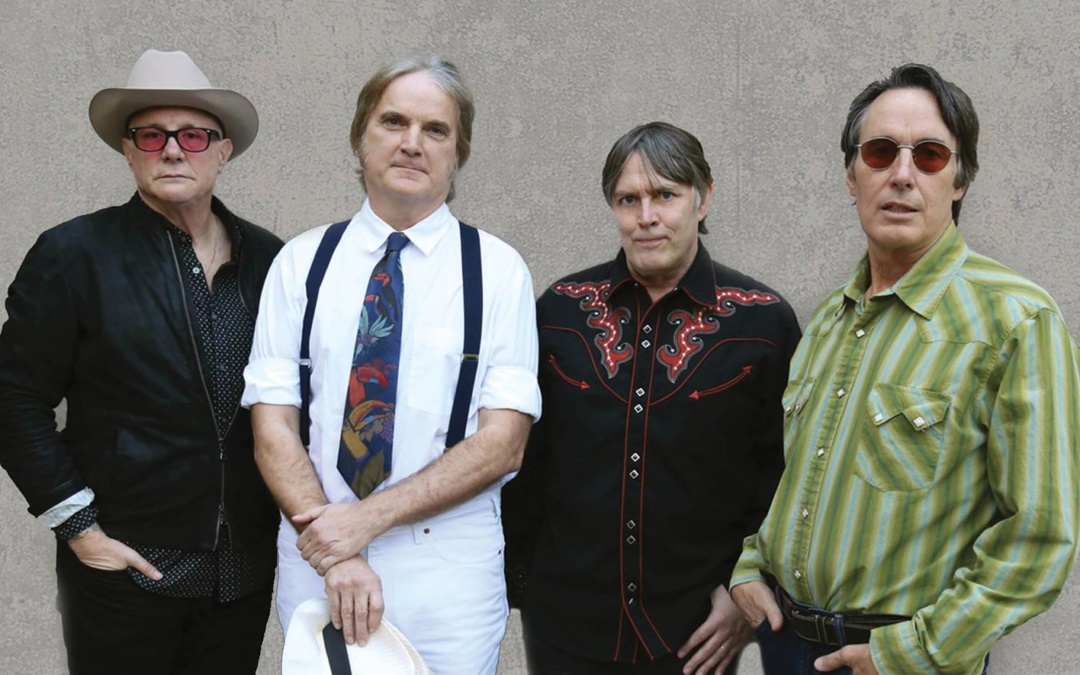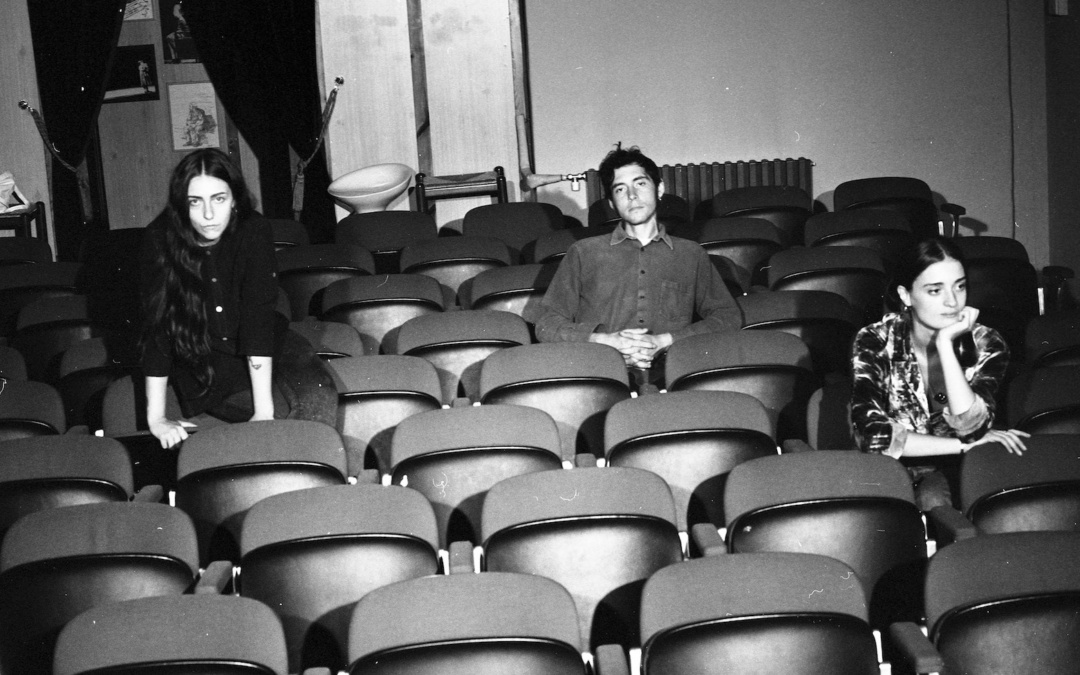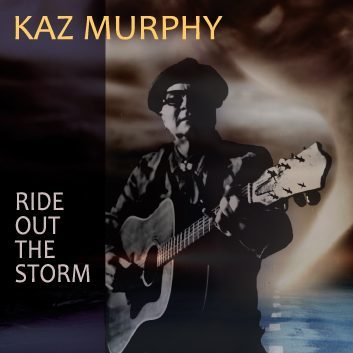
by Meredith Schneider | Mar 1, 2019 | albums, review
On this – the first day of March, in the year of all denominational acceptance, twenty nineteen – The Mowgli’s release their new EP, a 4-track collection titled American Feelings. And boy, do we have feelings. Beginning with first track “Hard to Love”, there are MAJOR feelings present in this album. And though The Mowlgi’s aren’t known for hiding their feelings, this is a new level of vulnerability. “Hard to Love”, in particular, is this insane pop track that has this dance vibe that makes it impossible not to move. The lyrics, admittedly, are way less fun and slightly more paranoid than the soundscape, but the honesty through Dieden’s vocals – and that damn fine drum beat – keep us coming back for more.
But second track “Mr. Telephone” won’t disappoint after that incredible start, so don’t worry. female lead vocals provided by Katie Jayne Earl give everything a different dynamic, though it follows in the same “Holy shit this should be a #1 pop single” pattern is its predecessor. “Norman Rockwell” slows the pace down for us, but is no less layered and magical because of it. The way the lead vocals are weaved amidst the instrumentals reminds us of some of our favorite 90’s tracks, though we couldn’t necessarily assign a decade to those swooning instrumentals, that seem to knock us off our feet with every listen. Last track “Talk About It” swaps back to those female vocals, and even with the fast dance pace, it continues to touch on delicate topics. The lyrical content – had it been arranged any differently – may have truly made this a song to ponder your life to, crying alone in a room before making big decisions. But because of the pace and energy in the performance, there’s a juxtaposition that makes it so unique and beautiful.
Give it a spin if you want to feel the warm fuzzies for the rest of your day.
Keep up with The Mowgli’s here.

by Phlis | Feb 27, 2019 | 5 to 7
Cole Guerra has crafted a sound that balances on the edge between progressive rock and pop with latest project I Am Casting, a musical entity we have been captivated by since premiering “Clay” last year. Amidst the release of the project’s debut album, we got a few minutes to sit down and dig in with Guerra on everything music. Check it out below!
There was a time when you were studying and performing, were there any points where the focus of your studies intermingled with your song writing?
That period was well before writing any of the songs on Carnival Barkers. The overlap would have occurred primarily during the writing of an album called Scarves & Knives, which I put out under my own name years ago. I don’t believe that the focus of my studies really made its way into contemporaneous songwriting material, though I can look back and recognize that I was, at times, working some psychological stuff out (about myself) through my lyric writing.
On the other hand, my exposure during grad school and beyond to issues central to clinical psychology and social psychology has pretty clearly influenced my lyrics over the past couple years, while writing the tunes on Carnival Barkers.
Does your background in psychology help when writing lyrics?
In general, I’m sure that the psych background funnels me towards certain subject matter, even if I’m not altogether deliberate or conscious about this, and that it then informs the perspective I have on the chosen subjects. The psych background definitely influenced how I approached the material on Carnival Barkers. It was 2016 when I began working on the album, and from the start of lyric-writing I knew my framework was to write a collection of tunes that would observe, from various angles, something about the psychology of the political moment. Most of the songs offer a take on toxic influencers and/or their impact, both on those who ‘buy in’ to the message and those who do not. For example, I think of ‘Wolf’, ‘Charmer’, and ‘Lullaby’ as Pied Piper-like riffs, thematically. I view ‘Helpless’, ‘Muggers’, and ‘Seams’ as fragments of possible responses by those upended and left feeling powerless in the wake of a malignant carnival barker. ‘Flood’ and ‘Window’ are songs about the political exploitation of fear and prejudice.
Carnival Barkers will soon be released, “Flood” was the first single released from your new album. What is the background behind “Flood”?
‘Flood’ was one of the first songs written for Carnival Barkers – it was penned in mid-2016. During the run-up to the election, I was disgusted, like many, by how often Trump negatively framed non-white and non-European populations and made racial and ethnic distinctions increasingly salient. He was explicitly signalling to his political base that they should care about race and ethnicity differences, and that those outside their racial and ethnic ingroups (here’s the social psychology influence I referenced above) were clear threats. In essence, he seemed to have a strategy of stoking and then exploiting people’s fears about those in outgroups. We’ve seen this play out over the past couple years – in, for example, the alarmism about the “Caravan” or with the just-declared “national emergency”. ‘Flood’ tries to get at aspects of this, as does the song ‘Window’.
The video for “Flood” used footage of historical events that ties into the song, of the footage you used which part sums up “Flood” the most?
The juxtaposition of (a) clips from a 1957 promo piece by Redbook magazine that depicted tranquil white suburbia with (b) clips depicting the aggression and hostility of white women and men towards the Little Rock Nine during that same year.
After Scarves & Knives you kind of disappeared, what were you doing in that time?
At the time of releasing Scarves & Knives, and then touring in support of it, I was ‘on leave’ from my clinical psychology program. I had a decision to make after touring – do I finish the degree or commit full-time to music? I was invested in both possible paths and knew I wanted to wrap up the doctoral degree and keep the door open to becoming a practicing psychologist. I re-engaged in the grad program, which was a pretty immersive thing involving dissertation writing and clinical work, followed by an internship and subsequent ‘post-doc’ experience. After that, I jumped into developing my clinical psychology practice. During that stretch, whenever I tried to write music, it just felt kind of painful – like if I couldn’t do it full-on, why bother? Hard to explain, really. I somehow ended up going years without doing anything music-related. Most of that time, I didn’t even touch a guitar or keyboard. It wasn’t until 2016 that I began writing again.
Is there any overall advantage from working primarily from your home studio?
Yes, absolutely, especially as I’ve come to view tracking itself as an important part of my songwriting process – things are pretty iterative at this point, so I benefit from having the ability to easily go in and adjust, rinse, repeat, etc. I guess I could just call what I end up with a ‘demo’ and then go to a full-fledged studio, but the home studio is sufficient for me to obtain most of what I’m after – there are exceptions, and I did leave the home space to record some stuff.
What element of Carnival Barkers are you most proud of and why?
Probably that it feels like an album. There are thematic threads that connect the tunes, as I was describing earlier, and I think there are musical threads that do the same (arrangement choices, tonally coherent). Hopefully, if a listener takes in the full LP in a single gulp, there is a “whole is greater than the sum of its parts” type impact.
You studied piano as a child, how did this set you up musically for your future musical endeavors?
I’m sure that early exposure to an instrument was one of the things that contributed to a love of music, along with extensive music-listening as a young kid. I’m also pretty sure that playing the piano made it easier to learn and play the guitar, which I picked up just after high school. This is conjecture, but maybe the most significant impact of playing an instrument as a young kid was that it introduced me very early on to the idea that one’s experience with music can be that of an active participant.
What was it about Richard Buckner’s Since that captivated you so much?
Just about everything, really. Chord progressions and melodies that grabbed me immediately and then somehow continued to grow on me after a ridiculous amount of spins. The sound itself – dry vocal upfront, immersive + emotional musical beds. The tunes cohere as an album, and yet there is a great amount of variability in song tempos, tone, structure, and length. I usually don’t weigh lyrical content that greatly in my music preferences, but Buckner’s lyrics on Since are just incredible. And lastly, the tunes seemed so specifically him – I didn’t have a clear sense of ‘influences’.
Since also introduced me to the work of producer and bassist JD Foster, who had produced the LP as well as Bucker’s preceding album, Devotion & Doubt. A few years after the release of Since, I invited JD to a show I was playing in NYC – the conversation with JD after that gig eventually led to the making of Scarves & Knives.
Why did it take a text from Ian Schreier to get you making music again, had you not thought of your music before that point?
There was something motivating about re-engaging with people I’d worked on music with in the past – Ian had mixed Scarves & Knives and been involved in some of the recording as well. Also, quite frankly, it was probably that the messages from Ian over a couple months, along with some other input from musicians I respect a lot, helped to build up some lost confidence. The initial communication from Ian led to a couple meetings at the studio where he typically works, and to me taking a plunge on buying some home recording software/hardware – I’d never had any recording gear previously.
When creating music for Carnival Barkers it was the lyrics that came second, what is your usual creative process of writing?
Lyrics have always come relatively late in the process for me. Frankly, as a listener, the music (the chord progression, the melody, the texture/sound/feel, etc.) speaks to me far more than does any lyric. A bad lyric can put me off, but I’ll listen to a great-sounding tune with middling lyrics. A good lyric is like a bonus of sorts, icing on the cake.
Though I’ve always written music before lyrics, the creative process did change quite a bit for Carnival Barkers. Prior to CB, I’d write the progression + melody + lyric while sitting with a guitar or at the piano, and think about arrangement and texture after the song was, in essence, ‘done’. With CB, the home recording setup and software enabled me to write and record percussion (and other) parts in tandem with the keys or guitar, and the rhythm and ‘texture’ tracks ended up influencing my progressions and melodies to a degree I never would have predicted – I really prefer this newer approach. As I start playing with a vocal melody over a progression I’ve already written and recorded, a lyrical idea or theme will sort of emerge – usually a phrase or two grab me and then I shape the remaining lyric accordingly.
Thank you for giving Imperfect Fifth this interview, is there anything you would like to add?
No, other than thanks for expressing interest in the album!
___
Keep up with I Am Casting here.

by Meredith Schneider | Feb 25, 2019 | albums, wolf tracks
On February 15th, Kalyn Fay released her new 11-track full-length, Good Company, to a patiently waiting bevy of fans. Hailing from Claremore, OK, Kalyn Fay is a of Cherokee descent, and happened to have earned her undergraduate and master’s degrees while consuming herself in songwriting. Her work is incredible, and this new release is no different. We’re thrilled that it’s now out in the world for all of us to enjoy.
Beginning slowly, the title track carries us into a robust and wonderful soundscape, a pace that is reduced again in “Wait for Me”. “Highway Driving” gives us more of that quintessential twang and Fay’s voice gets raspier, which is the truth for “Baby Don’t You Worry” as well, a more bluesy and rich track. “Come Around” continues at this pace, but has more of a an ethereal feel to it than its predecessors, while sixth track “Long Time Coming” almost seems to play with dissonance, with its trudging and melancholic, yet wonderful, instrumentals.
“Oklahoma Hills” has a piece of home in it, “Alright in the End” feels morbid with its title but turns out to be a very comforting and warm song, and “Faint Memory” is perhaps the softest and most Lillith Fair-worthy track, a commentary on how easy it is for time to “play tricks” on you. “Fool’s Heartbreak” sounds more like the southern music that inspired the track itself, soulful in its disposition. “Dressed In White” rounds it all out nicely, alluding to marriage, of course. But we see it as infusing a sense of a freedom in a young woman, whether her father is offering her up for marriage or to live a healthy, independent lifestyle.
Either way, we feel that fullness and that freedom as the last notes hit, a faint smile left on our lips.
Keep up with Kalyn Fay here.

by Meredith Schneider | Feb 22, 2019 | albums, review
Following in our nostalgic-tinged soundscape-leaning pattern, noir pop duo 8MM – Juliette Beavan and Sean Beavan – we hear a little 90s pop woven in with their quintessential sound in “Self-Inflicted Heartache”, the first track off their new released Heart-Shaped Hell. As you may have guessed, the soundscape twists and turns after that, a bit more edge to “Supercrush” before leading into a true pop single with the title track, somehow delivered with an eery twist. “Bring It On” is the most moody of them all, the second half growing powerful with the added male vocals. The pair round it out nicely with “Move With Me” and its accompanying radio edit, slower paced, but filled with emotional range to keep you on a sort of edge regardless.
Stay on edge with Heart-Shaped Hell. It’s a wonderful experience.
Keep up with 8MM here.

by Meredith Schneider | Feb 22, 2019 | albums, review
Electro-pop stunner Host released her debut EP this week, and you’re in for a real party with Adolescent Content. And – though the lyrics sometimes take a turn for the more serious, like third track “Taste of Your Love” and the way it highlights a breakup – the entire EP is something that will get your heart pumping and leave that glittery, enticing feeling of nostalgia in your veins.
“Goodbye” is sugar sweet 80’s pop, something you immediately feel like you need to bop your head to while wearing a pastel windbreaker. Host’s vocals dim the electric energy slightly, but only to give it a moody, ethereal feel. Second track “B4me” of course follows suit, but is led by ints interesting percussive aspects. It’s one of those songs that, for half of it, you’re not really sure how to dance to it. But it’s intriguing and beautiful as well, not unlike chaotic predecessor “Taste of Your Love”. By the time we get to “Forgetting Me”, we are ready for the slight pace change, luring us into a hypnotic spell with its drawn out notes and swirling soundscape.
Keep up with Host here.

by Meredith Schneider | Feb 15, 2019 | albums, review, wolf tracks
Originally formed in 1981, Los Angeles-based alt-country rock collective The Long Ryders may have been through a few lineup changes over the years, but they’re back and strong as ever with new full length Psychedelic Country Soul. Within this twelve track stunner, Sid Griffin, Stephen McCarthy, Tom Stevens, and Greg Sowders have developed a truly enjoyable work of art, beginning with the easygoing sounds of “Greenville” and bouncing all the way through to the title track in slot twelve.
But of course those aren’t the only two songs of note on this work. If you’re into names in songs – we’re still trying to find one for all of our friends – then “Molly Somebody” is perfect for you. You can choose to replace “Molly” with any name, but this story has some specificity to it that wouldn’t otherwise translate, so be aware before you try to declare your love with the grand gesture of song. “If You Want to See Me Cry” is a slow, beautiful track, the soundscape reflecting its melancholic title. Additionally, if you’re looking for the perfect backdrop for that next cross country road trip, “California” is pure perfection. You can imagine it playing in the background while driving on a back road, your hair blowing in the wind. (In slow motion of course.)
If you’re interested in new music with solid lyricism, a band with interesting history, and a little bit of twang, you will truly enjoy Psychedelic Country Soul. Take it for a spin below!
Keep up with The Long Ryders here.

by Ian Schneider | Feb 11, 2019 | albums, review
Tommy Bazarian’s, known by his musical space Lampland, debut album No Mood is debuting with a thunderous wave of emotion and sounds that will make you sway. Bazarian utilized his day job of being a radio producer to form the album’s lyrics, and his past formed the stories that are portrayed with drum loops, synths, and even a dash of some trumpets.
Bazarian’s vocals remind this listener faintly of The Smashing Pumpkins front man Billy Corgan. The whispering-moody feeling is definitely present throughout, but Bazarian makes it his own with his ability to compose unique music that is not like that of the loose comparison I have made.
This description on Lampland’s website, which you can find here, perfectly encapsulates what this debut album brings to the table sonically:
“In the spirit of Paul Simon’s solo albums, No Mood features almost as many genres as tracks. Alt-country rockers sit next to Elliott Smith four-track recordings, followed by dramatic full band arrangements. It’s all held together by Bazarian’s distinctive voice, by his vivid lyrics, and by his restless energy. Which, by the end of the album, he’s come to accept. ‘I know that you don’t blink insanely’, he sings. ‘Well, I do.'”
You can find more information on Lampland and No Mood at https://www.lamplandband.com/.

by Meredith Schneider | Feb 8, 2019 | albums, review
Italian shoegaze musical act Be Forest – comprised of Costanza Delle Rose (Bass and vocals), Nicola Lampredi (Guitar), and Erica Terenzi (Drum, synths and vocals) – released their new full-length today, a swirling and intense collection of songs titled Knocturne. Beginning with the moody instrumental track “Atto I”, the soundscape doesn’t vary too much heading into “Empty Space”, though additional background vocals and reverb are layered in. By third track “Gemini”, you realize the soundscapes are all strikingly similar, and that you’re truly on an instrumental adventure that could not have been laid out – and taken as successfully – any other way. “K’ is most notable for its quirky percussion amidst the same whirring guitars and intense disposition as its predecessors.
“Sigfrido”, somehow, brings us into an even darker soundscape, making this work of art much moodier than Earthbeat, which came before it in 2014. This song belongs in a transformational film, and we’re backing that idea 100%. “Atto II” has the clear markings of its first, though definitely begins in a more mysterious place, eventually exploding into a cacophony of ominous sound.
“Bengala” has a much more noticeable 80s influence, the beginning bringing the mood back up slightly. It doesn’t altogether abandon the darkness, as there are guitar parts that simply belong on the Warped stage and iron out any feelings of overwhelming lightness we may have shifted into. We wonder most about the inspiration behind the track “Fragment”, as it is packed with finesse and strength, leading us perfectly into last track “You, Nothing” which simplifies the instrumental pace slightly, allowing us to really enjoy Costanza’s vocals.
Keep up with Be Forest here.

by Ian Schneider | Feb 8, 2019 | albums, review
Kaz Murphy‘s music is about as Americana as it gets, and his newest release Ride Out The Storm is no exception. This folk artist’s sound is that of the old west, forming stories with each lyric and melodic refrain. Kaz has had an illustrious career, stemming from his beginnings as a lead-singer and drummer at age 10. He established himself as a respected writer of musicals in the 1980s, transitioning to music after forming a folk new wave band in 1988. Multitudes of bands and projects later, Murphy as come to Ride Out The Storm, which can be seen as a return to his roots.
Each track on this album paints a picture, forming simple, yet elegant, audio tapestries for us to envision while listening. Stories of younger days, tough times, and perseverance are spread throughout the 11 song project. While listening, I couldn’t help but think about my own difficult situations. I also couldn’t help to make a vocal and sound comparisons to country-western artist Marty Robbins and the illustrious Johnny Cash.
For those looking to get lost in deep Americana story telling, then Ride Out The Storm is the album you must listen to. Ride Out The Storm is out now. You can visit Kaz Murphy’s website at https://kazmurphy.com/ for more information.









